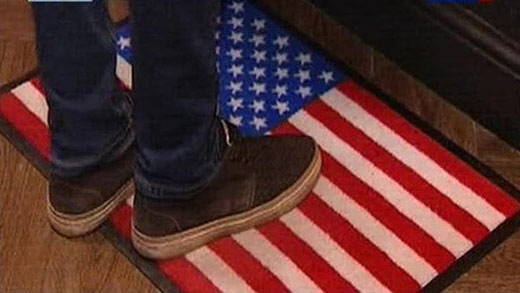當(dāng)前位置: Language Tips> 雙語(yǔ)新聞
Russia's 'patriotic' Putin cafe divides opinion
分享到

The opening of a cafe devoted to Russian President Vladimir Putin has raised eyebrows over its use of Western leaders' images in the toilets.
一家以俄羅斯總統(tǒng)弗拉基米爾?普京為主題的咖啡館近日開(kāi)業(yè),其廁所內(nèi)掛著的西方國(guó)家的領(lǐng)導(dǎo)人肖像真是讓人大跌眼鏡。
The appropriately named President cafe, in the Siberian city of Krasnoyarsk, has adorned its interior with photos of Mr Putin across the years, and plays the Russian national anthem every day at midnight, state-owned Rossiya 24 TV reports.
俄羅斯國(guó)有電視臺(tái)Rossiya 24報(bào)道稱,這個(gè)位于西伯利亞的克拉斯諾亞爾斯克市的總統(tǒng)咖啡館倒是名副其實(shí),內(nèi)部裝飾著普京各個(gè)時(shí)期的照片,每當(dāng)午夜時(shí)分就會(huì)奏響俄羅斯國(guó)歌。
But the establishment's toilets are a Putin-free zone. Labelled "Nato bloc", they're plastered with images of "non-friendly Western leaders" including David Cameron, Angela Merkel and Ukrainian President Petro Poroshenko, the report says. Barack Obama gets a look in too - on the toilet paper.
但是咖啡館的廁所里邊一張普京照片都沒(méi)有。據(jù)報(bào)道,這個(gè)叫做“北約集團(tuán)”的廁所里貼的都是“不友好的西方領(lǐng)導(dǎo)人”的照片,包括卡梅倫、默克爾,和烏克蘭總統(tǒng)波羅申科。奧巴馬當(dāng)然也露了臉——他被印在了廁紙上。
The owners have provided a black marker pen for visitors to add their own flourishes to the leaders' photos, and there's a less-than-subtle dig at the US underfoot, with American flag doormats. The menu doesn't discriminate, though, with both French fries and Coca Cola on offer.
咖啡館老板還給顧客提供黑色的馬克筆,任其在這些領(lǐng)導(dǎo)人的照片上涂鴉,而且門(mén)墊的圖案是美國(guó)國(guó)旗,大有把美國(guó)踩在腳下的嘲諷意味。不過(guò)菜單倒沒(méi)什么歧視,既有法式薯?xiàng)l也有可口可樂(lè)。

One customer tells the channel that he liked the toilets' decor and would "revisit it with pleasure", but the report notes that Krasnoyarsk residents aren't all so enthusiastic, with some concerned it could violate the law on inciting hatred.
一個(gè)顧客對(duì)Rossiya 24電視臺(tái)說(shuō)他喜歡廁所的這些裝飾,并會(huì)“很高興再來(lái)此地”,但是記者注意到克拉斯諾亞爾斯克的居民并不都是如此狂熱,有些人擔(dān)心這種做法可能會(huì)煽動(dòng)仇恨進(jìn)而觸犯法律。
Lawyer Igor Simonov seems to agree, telling the channel that individuals' images can't be used without permission. He says even if the use is satirical, it would violate "one's personal rights, honour, dignity and business reputation".
律師伊戈?duì)?西蒙諾夫似乎對(duì)此表示贊同,他對(duì)電視臺(tái)說(shuō),個(gè)人肖像非經(jīng)允許不得使用。他還說(shuō),即使只是用于諷刺,但也會(huì)侵犯“個(gè)人權(quán)利、名譽(yù)、尊嚴(yán)和企業(yè)聲譽(yù)”。
There's been a mixed response from Russians commenting online. On the Komsomolskaya Pravda website one person congratulates the owners for their idea and another says: "Everything is super! We wish you prosperity!" But a Moscow-based user says: "Such 'patriotisim' makes me sick."
俄羅斯人在網(wǎng)上對(duì)此事的評(píng)論褒貶不一。在真理報(bào)網(wǎng)上,一個(gè)人稱贊這個(gè)想法很好,另一個(gè)則說(shuō):“這一切都超贊!祝你們生意興隆!”但一個(gè)在莫斯科的用戶說(shuō):“這樣的‘愛(ài)國(guó)主義’真讓我惡心。”
Several others agree, with one writing: "This is so crude! We have to put up a real fight against our opponents - in the economy, in defence, in high living standards for our people, not fall to the level of primitive insults."
還有另外幾個(gè)人同意他的說(shuō)法,其中一個(gè)寫(xiě)道:“這也太粗魯了!我們必須向?qū)κ职l(fā)起真正的戰(zhàn)爭(zhēng)——在經(jīng)濟(jì)領(lǐng)域、國(guó)防領(lǐng)域,在提升人民的生活水平上,而不能淪落到低級(jí)的辱罵上。”
Vocabulary
dig: 挖苦
primitive: 未開(kāi)化的
英文來(lái)源:BBC
譯者:實(shí)習(xí)生孫美真
審校&編輯:丹妮
上一篇 : 泰國(guó)小象見(jiàn)人就給愛(ài)的抱抱
下一篇 : 13個(gè)英文“怪”習(xí)語(yǔ)的起源
分享到
關(guān)注和訂閱


口語(yǔ)
關(guān)于我們 | 聯(lián)系方式 | 招聘信息
電話:8610-84883645
傳真:8610-84883500
Email: languagetips@chinadaily.com.cn